Skills for Learning in Care: Role of Critical Reflection in Practice
VerifiedAdded on 2020/06/06
|10
|2636
|54
Report
AI Summary
This report delves into the crucial skills for learning in the care sector, emphasizing the significance of reflective practice and critical reflection for healthcare professionals. It begins by highlighting the importance of self-reflective approaches in improving service quality and addressing sensitive issues within health and social care. The Gibbs reflective cycle is introduced as a framework for structured analysis of experiences, encompassing description, feelings, evaluation, analysis, conclusion, and action. The report further explores the concepts of "reflection-in-action" and "reflection-on-action" and their role in professional development. It also examines the barriers to reflective practice, such as time constraints and organizational culture, while underscoring the benefits of improved memory, mindfulness, and interpersonal relationships. The report concludes by emphasizing the importance of honesty, journaling, and evidence-based practices in fostering a culture of continuous improvement within the health and social care environment.
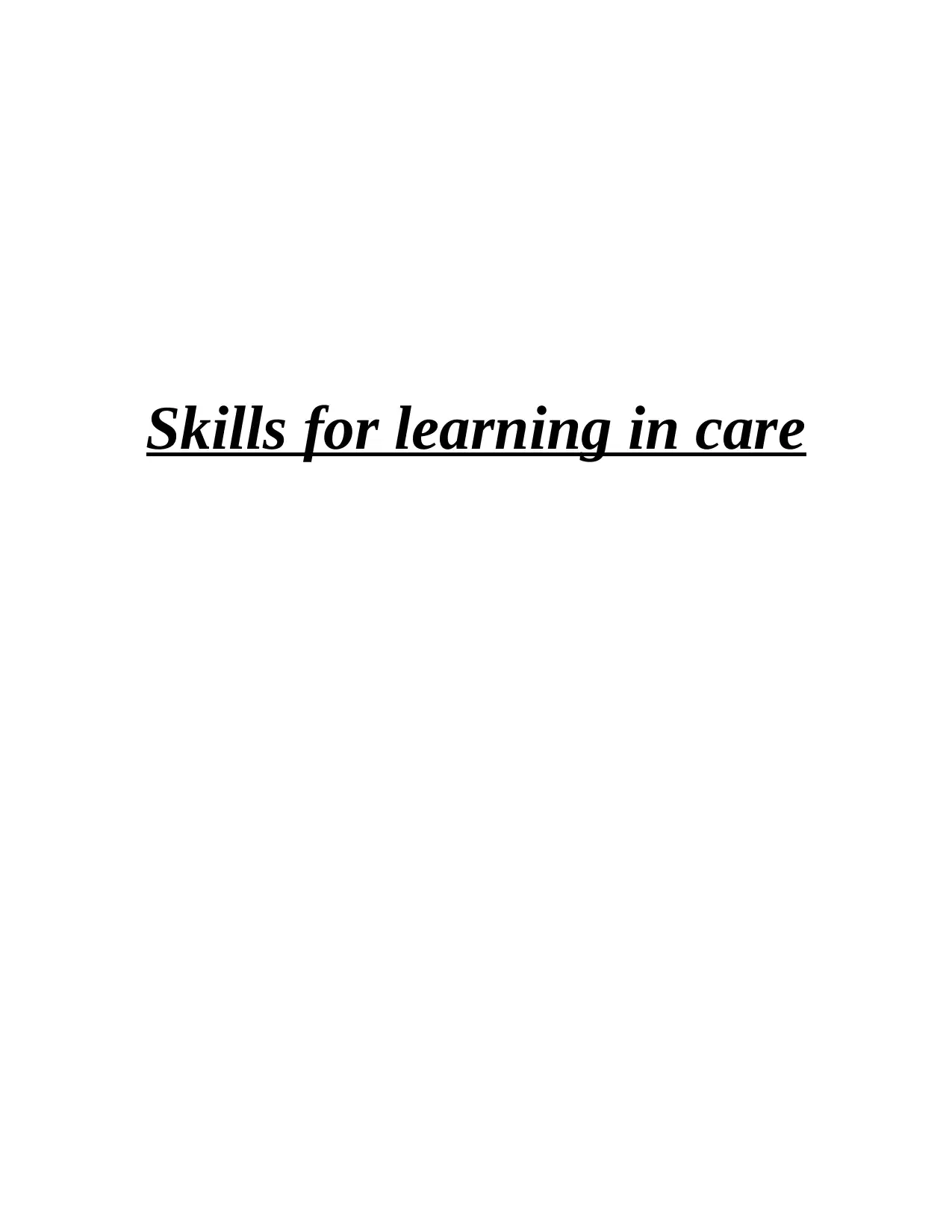
Skills for learning in care
Paraphrase This Document
Need a fresh take? Get an instant paraphrase of this document with our AI Paraphraser
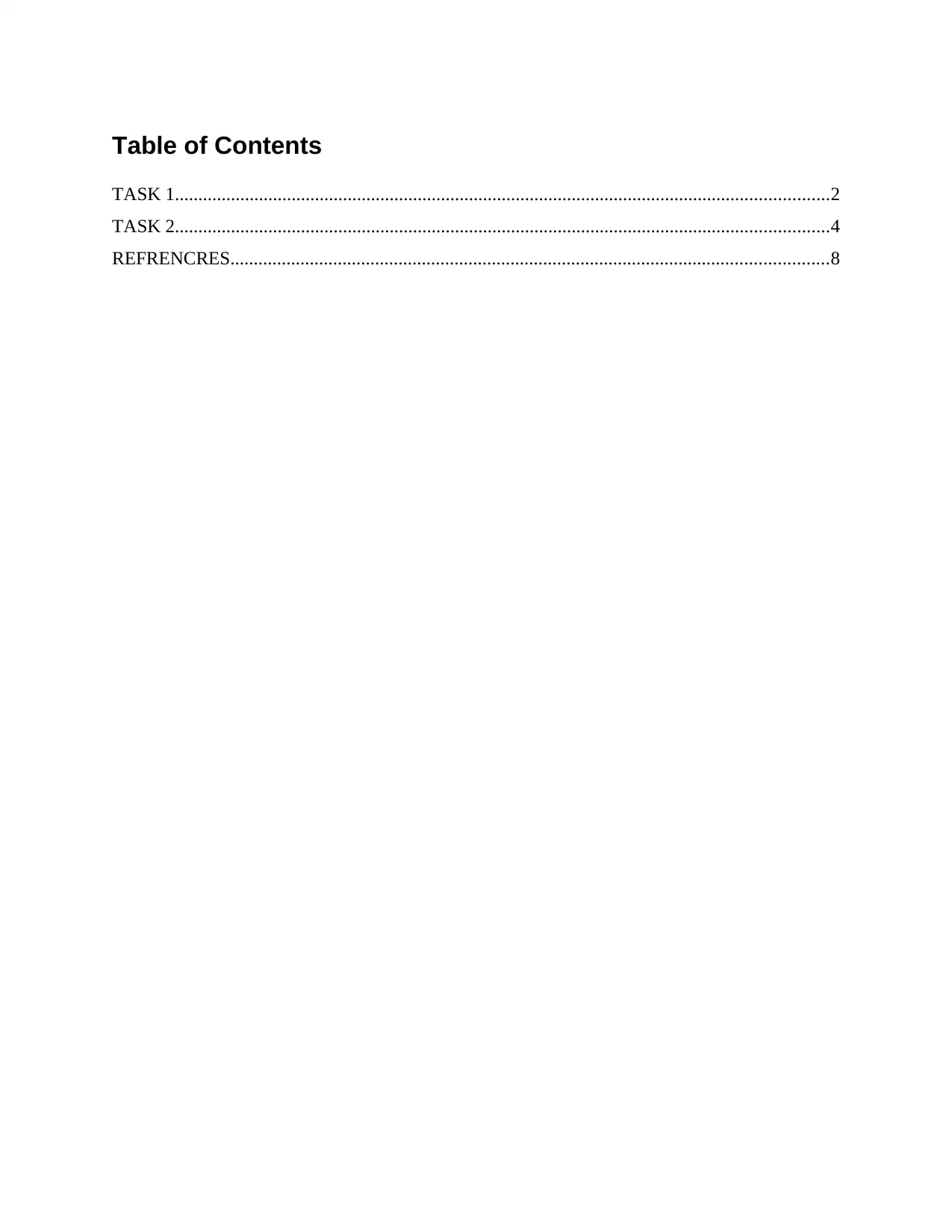
Table of Contents
TASK 1............................................................................................................................................2
TASK 2............................................................................................................................................4
REFRENCRES................................................................................................................................8
TASK 1............................................................................................................................................2
TASK 2............................................................................................................................................4
REFRENCRES................................................................................................................................8
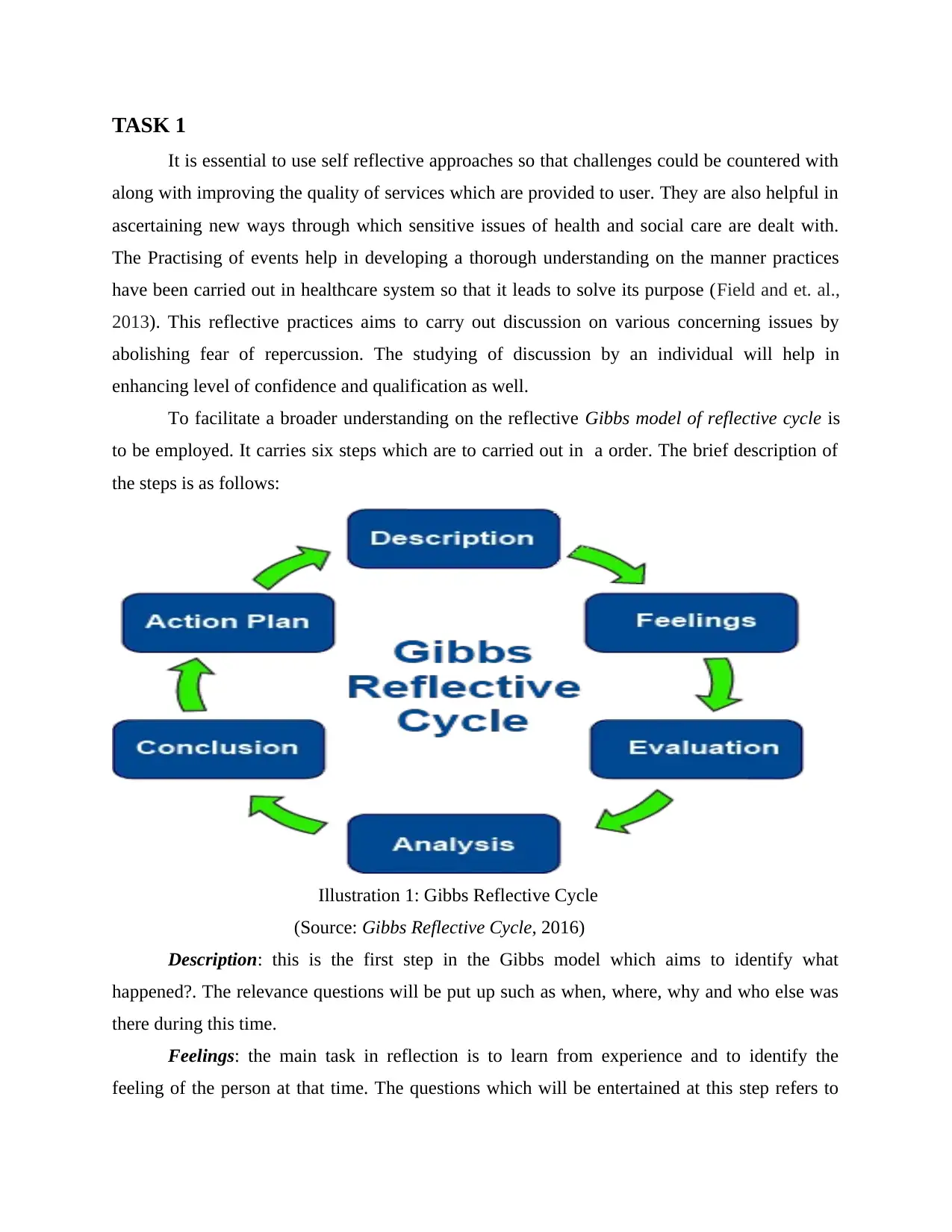
TASK 1
It is essential to use self reflective approaches so that challenges could be countered with
along with improving the quality of services which are provided to user. They are also helpful in
ascertaining new ways through which sensitive issues of health and social care are dealt with.
The Practising of events help in developing a thorough understanding on the manner practices
have been carried out in healthcare system so that it leads to solve its purpose (Field and et. al.,
2013). This reflective practices aims to carry out discussion on various concerning issues by
abolishing fear of repercussion. The studying of discussion by an individual will help in
enhancing level of confidence and qualification as well.
To facilitate a broader understanding on the reflective Gibbs model of reflective cycle is
to be employed. It carries six steps which are to carried out in a order. The brief description of
the steps is as follows:
Illustration 1: Gibbs Reflective Cycle
(Source: Gibbs Reflective Cycle, 2016)
Description: this is the first step in the Gibbs model which aims to identify what
happened?. The relevance questions will be put up such as when, where, why and who else was
there during this time.
Feelings: the main task in reflection is to learn from experience and to identify the
feeling of the person at that time. The questions which will be entertained at this step refers to
It is essential to use self reflective approaches so that challenges could be countered with
along with improving the quality of services which are provided to user. They are also helpful in
ascertaining new ways through which sensitive issues of health and social care are dealt with.
The Practising of events help in developing a thorough understanding on the manner practices
have been carried out in healthcare system so that it leads to solve its purpose (Field and et. al.,
2013). This reflective practices aims to carry out discussion on various concerning issues by
abolishing fear of repercussion. The studying of discussion by an individual will help in
enhancing level of confidence and qualification as well.
To facilitate a broader understanding on the reflective Gibbs model of reflective cycle is
to be employed. It carries six steps which are to carried out in a order. The brief description of
the steps is as follows:
Illustration 1: Gibbs Reflective Cycle
(Source: Gibbs Reflective Cycle, 2016)
Description: this is the first step in the Gibbs model which aims to identify what
happened?. The relevance questions will be put up such as when, where, why and who else was
there during this time.
Feelings: the main task in reflection is to learn from experience and to identify the
feeling of the person at that time. The questions which will be entertained at this step refers to
⊘ This is a preview!⊘
Do you want full access?
Subscribe today to unlock all pages.

Trusted by 1+ million students worldwide
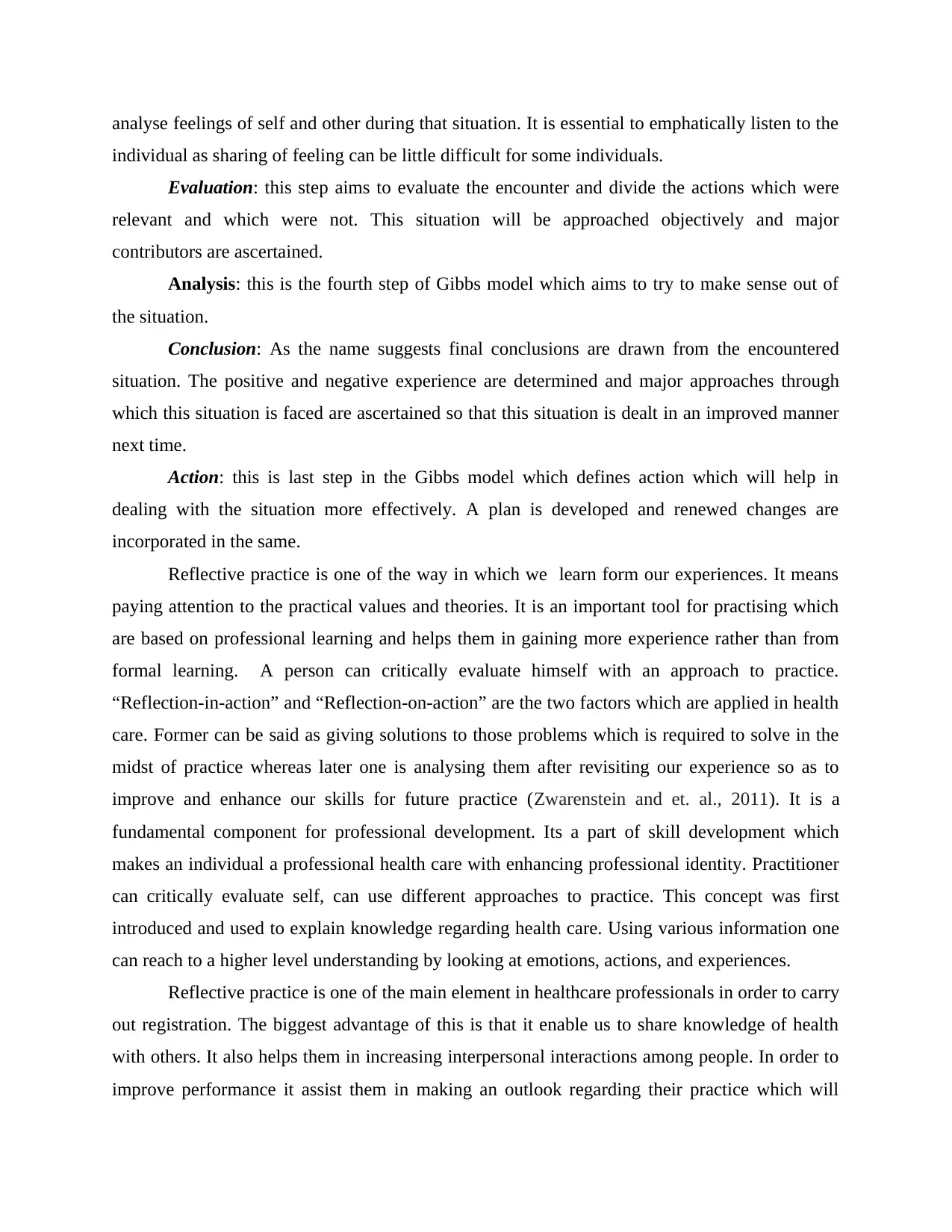
analyse feelings of self and other during that situation. It is essential to emphatically listen to the
individual as sharing of feeling can be little difficult for some individuals.
Evaluation: this step aims to evaluate the encounter and divide the actions which were
relevant and which were not. This situation will be approached objectively and major
contributors are ascertained.
Analysis: this is the fourth step of Gibbs model which aims to try to make sense out of
the situation.
Conclusion: As the name suggests final conclusions are drawn from the encountered
situation. The positive and negative experience are determined and major approaches through
which this situation is faced are ascertained so that this situation is dealt in an improved manner
next time.
Action: this is last step in the Gibbs model which defines action which will help in
dealing with the situation more effectively. A plan is developed and renewed changes are
incorporated in the same.
Reflective practice is one of the way in which we learn form our experiences. It means
paying attention to the practical values and theories. It is an important tool for practising which
are based on professional learning and helps them in gaining more experience rather than from
formal learning. A person can critically evaluate himself with an approach to practice.
“Reflection-in-action” and “Reflection-on-action” are the two factors which are applied in health
care. Former can be said as giving solutions to those problems which is required to solve in the
midst of practice whereas later one is analysing them after revisiting our experience so as to
improve and enhance our skills for future practice (Zwarenstein and et. al., 2011). It is a
fundamental component for professional development. Its a part of skill development which
makes an individual a professional health care with enhancing professional identity. Practitioner
can critically evaluate self, can use different approaches to practice. This concept was first
introduced and used to explain knowledge regarding health care. Using various information one
can reach to a higher level understanding by looking at emotions, actions, and experiences.
Reflective practice is one of the main element in healthcare professionals in order to carry
out registration. The biggest advantage of this is that it enable us to share knowledge of health
with others. It also helps them in increasing interpersonal interactions among people. In order to
improve performance it assist them in making an outlook regarding their practice which will
individual as sharing of feeling can be little difficult for some individuals.
Evaluation: this step aims to evaluate the encounter and divide the actions which were
relevant and which were not. This situation will be approached objectively and major
contributors are ascertained.
Analysis: this is the fourth step of Gibbs model which aims to try to make sense out of
the situation.
Conclusion: As the name suggests final conclusions are drawn from the encountered
situation. The positive and negative experience are determined and major approaches through
which this situation is faced are ascertained so that this situation is dealt in an improved manner
next time.
Action: this is last step in the Gibbs model which defines action which will help in
dealing with the situation more effectively. A plan is developed and renewed changes are
incorporated in the same.
Reflective practice is one of the way in which we learn form our experiences. It means
paying attention to the practical values and theories. It is an important tool for practising which
are based on professional learning and helps them in gaining more experience rather than from
formal learning. A person can critically evaluate himself with an approach to practice.
“Reflection-in-action” and “Reflection-on-action” are the two factors which are applied in health
care. Former can be said as giving solutions to those problems which is required to solve in the
midst of practice whereas later one is analysing them after revisiting our experience so as to
improve and enhance our skills for future practice (Zwarenstein and et. al., 2011). It is a
fundamental component for professional development. Its a part of skill development which
makes an individual a professional health care with enhancing professional identity. Practitioner
can critically evaluate self, can use different approaches to practice. This concept was first
introduced and used to explain knowledge regarding health care. Using various information one
can reach to a higher level understanding by looking at emotions, actions, and experiences.
Reflective practice is one of the main element in healthcare professionals in order to carry
out registration. The biggest advantage of this is that it enable us to share knowledge of health
with others. It also helps them in increasing interpersonal interactions among people. In order to
improve performance it assist them in making an outlook regarding their practice which will
Paraphrase This Document
Need a fresh take? Get an instant paraphrase of this document with our AI Paraphraser
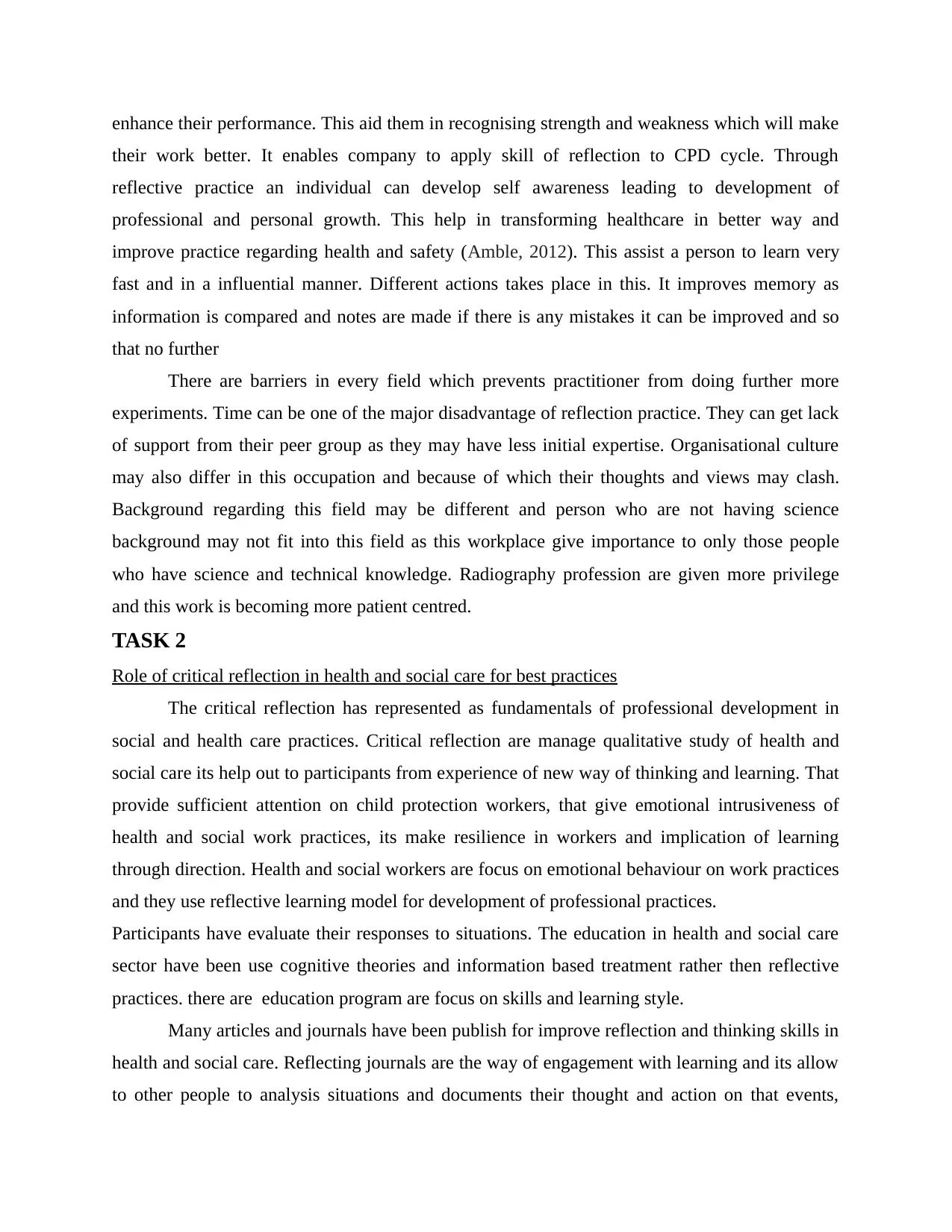
enhance their performance. This aid them in recognising strength and weakness which will make
their work better. It enables company to apply skill of reflection to CPD cycle. Through
reflective practice an individual can develop self awareness leading to development of
professional and personal growth. This help in transforming healthcare in better way and
improve practice regarding health and safety (Amble, 2012). This assist a person to learn very
fast and in a influential manner. Different actions takes place in this. It improves memory as
information is compared and notes are made if there is any mistakes it can be improved and so
that no further
There are barriers in every field which prevents practitioner from doing further more
experiments. Time can be one of the major disadvantage of reflection practice. They can get lack
of support from their peer group as they may have less initial expertise. Organisational culture
may also differ in this occupation and because of which their thoughts and views may clash.
Background regarding this field may be different and person who are not having science
background may not fit into this field as this workplace give importance to only those people
who have science and technical knowledge. Radiography profession are given more privilege
and this work is becoming more patient centred.
TASK 2
Role of critical reflection in health and social care for best practices
The critical reflection has represented as fundamentals of professional development in
social and health care practices. Critical reflection are manage qualitative study of health and
social care its help out to participants from experience of new way of thinking and learning. That
provide sufficient attention on child protection workers, that give emotional intrusiveness of
health and social work practices, its make resilience in workers and implication of learning
through direction. Health and social workers are focus on emotional behaviour on work practices
and they use reflective learning model for development of professional practices.
Participants have evaluate their responses to situations. The education in health and social care
sector have been use cognitive theories and information based treatment rather then reflective
practices. there are education program are focus on skills and learning style.
Many articles and journals have been publish for improve reflection and thinking skills in
health and social care. Reflecting journals are the way of engagement with learning and its allow
to other people to analysis situations and documents their thought and action on that events,
their work better. It enables company to apply skill of reflection to CPD cycle. Through
reflective practice an individual can develop self awareness leading to development of
professional and personal growth. This help in transforming healthcare in better way and
improve practice regarding health and safety (Amble, 2012). This assist a person to learn very
fast and in a influential manner. Different actions takes place in this. It improves memory as
information is compared and notes are made if there is any mistakes it can be improved and so
that no further
There are barriers in every field which prevents practitioner from doing further more
experiments. Time can be one of the major disadvantage of reflection practice. They can get lack
of support from their peer group as they may have less initial expertise. Organisational culture
may also differ in this occupation and because of which their thoughts and views may clash.
Background regarding this field may be different and person who are not having science
background may not fit into this field as this workplace give importance to only those people
who have science and technical knowledge. Radiography profession are given more privilege
and this work is becoming more patient centred.
TASK 2
Role of critical reflection in health and social care for best practices
The critical reflection has represented as fundamentals of professional development in
social and health care practices. Critical reflection are manage qualitative study of health and
social care its help out to participants from experience of new way of thinking and learning. That
provide sufficient attention on child protection workers, that give emotional intrusiveness of
health and social work practices, its make resilience in workers and implication of learning
through direction. Health and social workers are focus on emotional behaviour on work practices
and they use reflective learning model for development of professional practices.
Participants have evaluate their responses to situations. The education in health and social care
sector have been use cognitive theories and information based treatment rather then reflective
practices. there are education program are focus on skills and learning style.
Many articles and journals have been publish for improve reflection and thinking skills in
health and social care. Reflecting journals are the way of engagement with learning and its allow
to other people to analysis situations and documents their thought and action on that events,
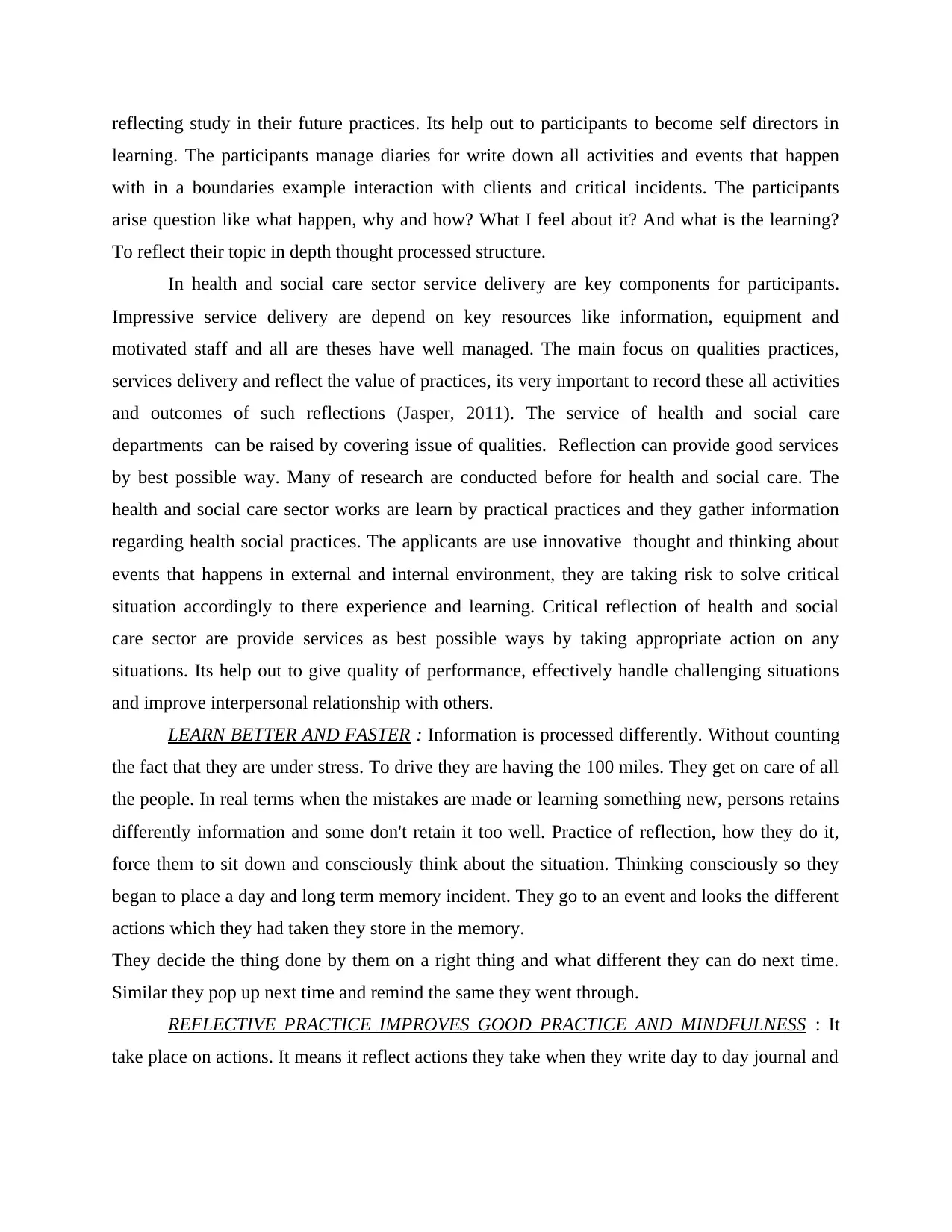
reflecting study in their future practices. Its help out to participants to become self directors in
learning. The participants manage diaries for write down all activities and events that happen
with in a boundaries example interaction with clients and critical incidents. The participants
arise question like what happen, why and how? What I feel about it? And what is the learning?
To reflect their topic in depth thought processed structure.
In health and social care sector service delivery are key components for participants.
Impressive service delivery are depend on key resources like information, equipment and
motivated staff and all are theses have well managed. The main focus on qualities practices,
services delivery and reflect the value of practices, its very important to record these all activities
and outcomes of such reflections (Jasper, 2011). The service of health and social care
departments can be raised by covering issue of qualities. Reflection can provide good services
by best possible way. Many of research are conducted before for health and social care. The
health and social care sector works are learn by practical practices and they gather information
regarding health social practices. The applicants are use innovative thought and thinking about
events that happens in external and internal environment, they are taking risk to solve critical
situation accordingly to there experience and learning. Critical reflection of health and social
care sector are provide services as best possible ways by taking appropriate action on any
situations. Its help out to give quality of performance, effectively handle challenging situations
and improve interpersonal relationship with others.
LEARN BETTER AND FASTER : Information is processed differently. Without counting
the fact that they are under stress. To drive they are having the 100 miles. They get on care of all
the people. In real terms when the mistakes are made or learning something new, persons retains
differently information and some don't retain it too well. Practice of reflection, how they do it,
force them to sit down and consciously think about the situation. Thinking consciously so they
began to place a day and long term memory incident. They go to an event and looks the different
actions which they had taken they store in the memory.
They decide the thing done by them on a right thing and what different they can do next time.
Similar they pop up next time and remind the same they went through.
REFLECTIVE PRACTICE IMPROVES GOOD PRACTICE AND MINDFULNESS : It
take place on actions. It means it reflect actions they take when they write day to day journal and
learning. The participants manage diaries for write down all activities and events that happen
with in a boundaries example interaction with clients and critical incidents. The participants
arise question like what happen, why and how? What I feel about it? And what is the learning?
To reflect their topic in depth thought processed structure.
In health and social care sector service delivery are key components for participants.
Impressive service delivery are depend on key resources like information, equipment and
motivated staff and all are theses have well managed. The main focus on qualities practices,
services delivery and reflect the value of practices, its very important to record these all activities
and outcomes of such reflections (Jasper, 2011). The service of health and social care
departments can be raised by covering issue of qualities. Reflection can provide good services
by best possible way. Many of research are conducted before for health and social care. The
health and social care sector works are learn by practical practices and they gather information
regarding health social practices. The applicants are use innovative thought and thinking about
events that happens in external and internal environment, they are taking risk to solve critical
situation accordingly to there experience and learning. Critical reflection of health and social
care sector are provide services as best possible ways by taking appropriate action on any
situations. Its help out to give quality of performance, effectively handle challenging situations
and improve interpersonal relationship with others.
LEARN BETTER AND FASTER : Information is processed differently. Without counting
the fact that they are under stress. To drive they are having the 100 miles. They get on care of all
the people. In real terms when the mistakes are made or learning something new, persons retains
differently information and some don't retain it too well. Practice of reflection, how they do it,
force them to sit down and consciously think about the situation. Thinking consciously so they
began to place a day and long term memory incident. They go to an event and looks the different
actions which they had taken they store in the memory.
They decide the thing done by them on a right thing and what different they can do next time.
Similar they pop up next time and remind the same they went through.
REFLECTIVE PRACTICE IMPROVES GOOD PRACTICE AND MINDFULNESS : It
take place on actions. It means it reflect actions they take when they write day to day journal and
⊘ This is a preview!⊘
Do you want full access?
Subscribe today to unlock all pages.

Trusted by 1+ million students worldwide
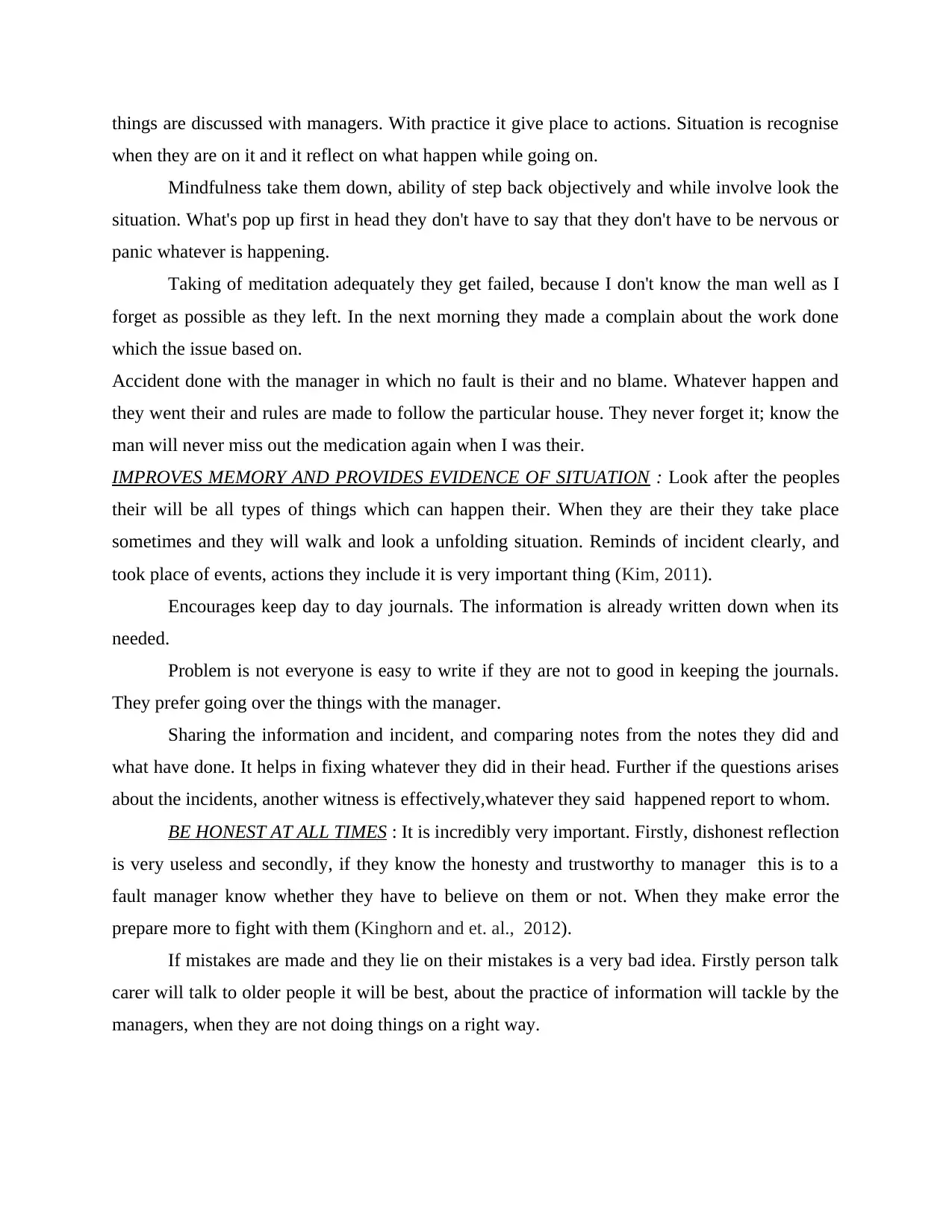
things are discussed with managers. With practice it give place to actions. Situation is recognise
when they are on it and it reflect on what happen while going on.
Mindfulness take them down, ability of step back objectively and while involve look the
situation. What's pop up first in head they don't have to say that they don't have to be nervous or
panic whatever is happening.
Taking of meditation adequately they get failed, because I don't know the man well as I
forget as possible as they left. In the next morning they made a complain about the work done
which the issue based on.
Accident done with the manager in which no fault is their and no blame. Whatever happen and
they went their and rules are made to follow the particular house. They never forget it; know the
man will never miss out the medication again when I was their.
IMPROVES MEMORY AND PROVIDES EVIDENCE OF SITUATION : Look after the peoples
their will be all types of things which can happen their. When they are their they take place
sometimes and they will walk and look a unfolding situation. Reminds of incident clearly, and
took place of events, actions they include it is very important thing (Kim, 2011).
Encourages keep day to day journals. The information is already written down when its
needed.
Problem is not everyone is easy to write if they are not to good in keeping the journals.
They prefer going over the things with the manager.
Sharing the information and incident, and comparing notes from the notes they did and
what have done. It helps in fixing whatever they did in their head. Further if the questions arises
about the incidents, another witness is effectively,whatever they said happened report to whom.
BE HONEST AT ALL TIMES : It is incredibly very important. Firstly, dishonest reflection
is very useless and secondly, if they know the honesty and trustworthy to manager this is to a
fault manager know whether they have to believe on them or not. When they make error the
prepare more to fight with them (Kinghorn and et. al., 2012).
If mistakes are made and they lie on their mistakes is a very bad idea. Firstly person talk
carer will talk to older people it will be best, about the practice of information will tackle by the
managers, when they are not doing things on a right way.
when they are on it and it reflect on what happen while going on.
Mindfulness take them down, ability of step back objectively and while involve look the
situation. What's pop up first in head they don't have to say that they don't have to be nervous or
panic whatever is happening.
Taking of meditation adequately they get failed, because I don't know the man well as I
forget as possible as they left. In the next morning they made a complain about the work done
which the issue based on.
Accident done with the manager in which no fault is their and no blame. Whatever happen and
they went their and rules are made to follow the particular house. They never forget it; know the
man will never miss out the medication again when I was their.
IMPROVES MEMORY AND PROVIDES EVIDENCE OF SITUATION : Look after the peoples
their will be all types of things which can happen their. When they are their they take place
sometimes and they will walk and look a unfolding situation. Reminds of incident clearly, and
took place of events, actions they include it is very important thing (Kim, 2011).
Encourages keep day to day journals. The information is already written down when its
needed.
Problem is not everyone is easy to write if they are not to good in keeping the journals.
They prefer going over the things with the manager.
Sharing the information and incident, and comparing notes from the notes they did and
what have done. It helps in fixing whatever they did in their head. Further if the questions arises
about the incidents, another witness is effectively,whatever they said happened report to whom.
BE HONEST AT ALL TIMES : It is incredibly very important. Firstly, dishonest reflection
is very useless and secondly, if they know the honesty and trustworthy to manager this is to a
fault manager know whether they have to believe on them or not. When they make error the
prepare more to fight with them (Kinghorn and et. al., 2012).
If mistakes are made and they lie on their mistakes is a very bad idea. Firstly person talk
carer will talk to older people it will be best, about the practice of information will tackle by the
managers, when they are not doing things on a right way.
Paraphrase This Document
Need a fresh take? Get an instant paraphrase of this document with our AI Paraphraser
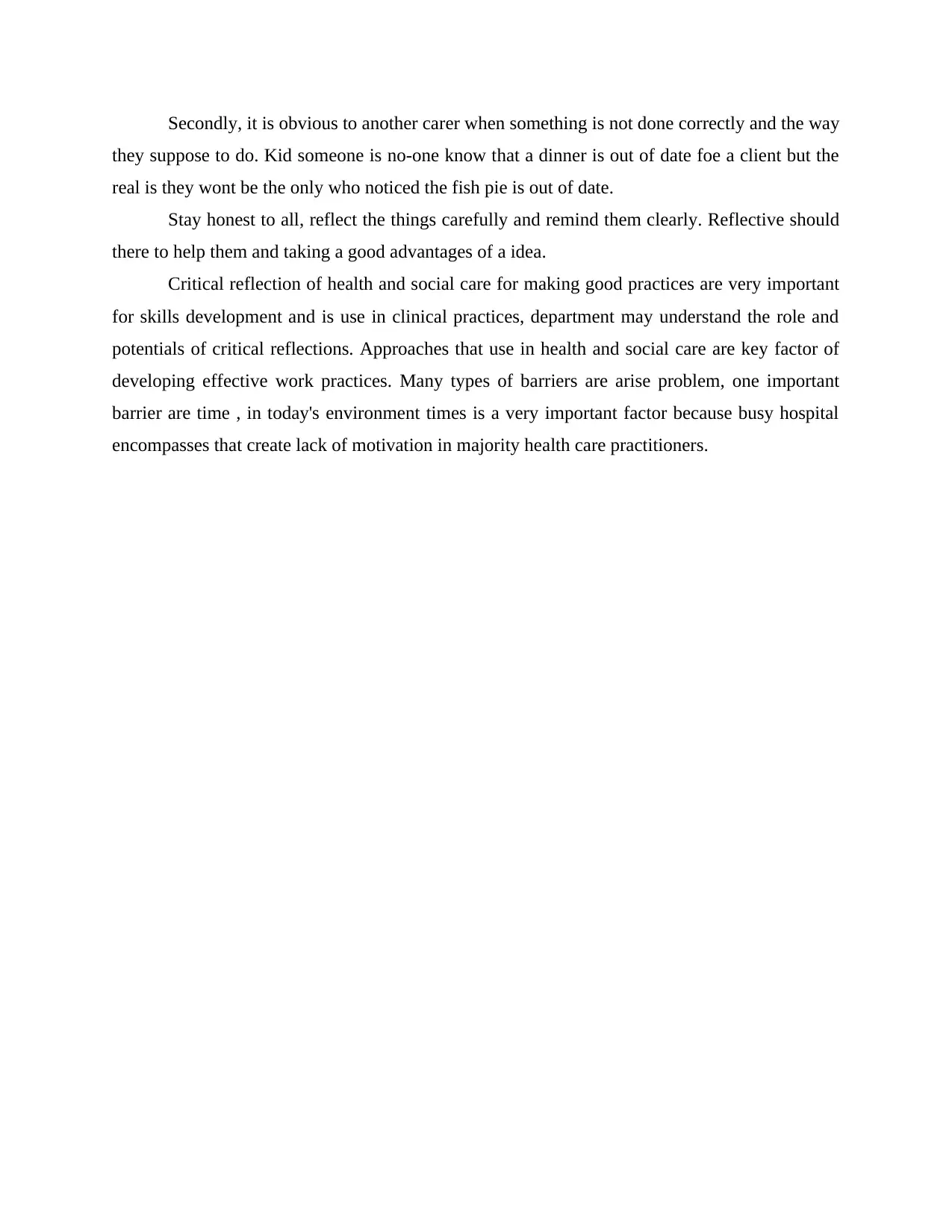
Secondly, it is obvious to another carer when something is not done correctly and the way
they suppose to do. Kid someone is no-one know that a dinner is out of date foe a client but the
real is they wont be the only who noticed the fish pie is out of date.
Stay honest to all, reflect the things carefully and remind them clearly. Reflective should
there to help them and taking a good advantages of a idea.
Critical reflection of health and social care for making good practices are very important
for skills development and is use in clinical practices, department may understand the role and
potentials of critical reflections. Approaches that use in health and social care are key factor of
developing effective work practices. Many types of barriers are arise problem, one important
barrier are time , in today's environment times is a very important factor because busy hospital
encompasses that create lack of motivation in majority health care practitioners.
they suppose to do. Kid someone is no-one know that a dinner is out of date foe a client but the
real is they wont be the only who noticed the fish pie is out of date.
Stay honest to all, reflect the things carefully and remind them clearly. Reflective should
there to help them and taking a good advantages of a idea.
Critical reflection of health and social care for making good practices are very important
for skills development and is use in clinical practices, department may understand the role and
potentials of critical reflections. Approaches that use in health and social care are key factor of
developing effective work practices. Many types of barriers are arise problem, one important
barrier are time , in today's environment times is a very important factor because busy hospital
encompasses that create lack of motivation in majority health care practitioners.
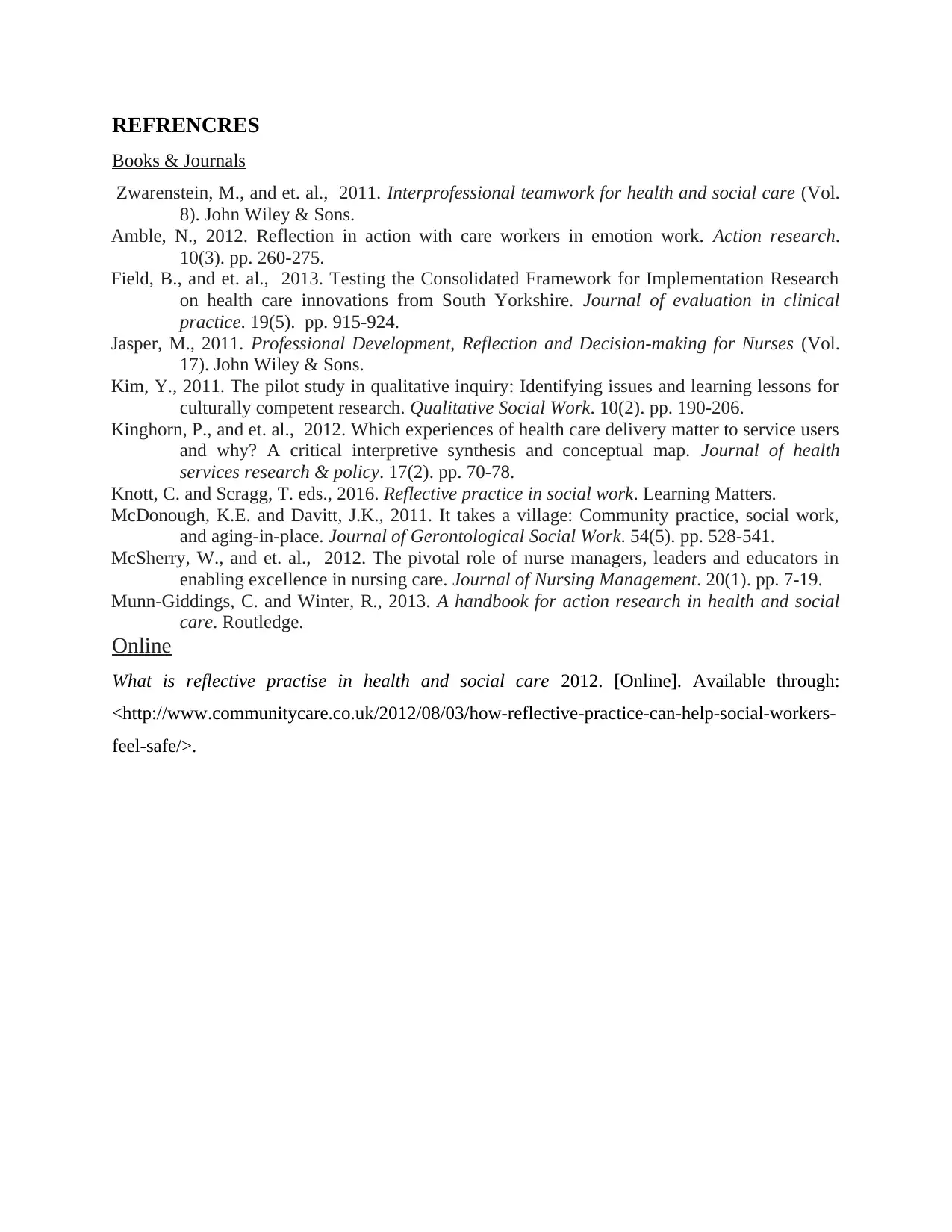
REFRENCRES
Books & Journals
Zwarenstein, M., and et. al., 2011. Interprofessional teamwork for health and social care (Vol.
8). John Wiley & Sons.
Amble, N., 2012. Reflection in action with care workers in emotion work. Action research.
10(3). pp. 260-275.
Field, B., and et. al., 2013. Testing the Consolidated Framework for Implementation Research
on health care innovations from South Yorkshire. Journal of evaluation in clinical
practice. 19(5). pp. 915-924.
Jasper, M., 2011. Professional Development, Reflection and Decision-making for Nurses (Vol.
17). John Wiley & Sons.
Kim, Y., 2011. The pilot study in qualitative inquiry: Identifying issues and learning lessons for
culturally competent research. Qualitative Social Work. 10(2). pp. 190-206.
Kinghorn, P., and et. al., 2012. Which experiences of health care delivery matter to service users
and why? A critical interpretive synthesis and conceptual map. Journal of health
services research & policy. 17(2). pp. 70-78.
Knott, C. and Scragg, T. eds., 2016. Reflective practice in social work. Learning Matters.
McDonough, K.E. and Davitt, J.K., 2011. It takes a village: Community practice, social work,
and aging-in-place. Journal of Gerontological Social Work. 54(5). pp. 528-541.
McSherry, W., and et. al., 2012. The pivotal role of nurse managers, leaders and educators in
enabling excellence in nursing care. Journal of Nursing Management. 20(1). pp. 7-19.
Munn-Giddings, C. and Winter, R., 2013. A handbook for action research in health and social
care. Routledge.
Online
What is reflective practise in health and social care 2012. [Online]. Available through:
<http://www.communitycare.co.uk/2012/08/03/how-reflective-practice-can-help-social-workers-
feel-safe/>.
Books & Journals
Zwarenstein, M., and et. al., 2011. Interprofessional teamwork for health and social care (Vol.
8). John Wiley & Sons.
Amble, N., 2012. Reflection in action with care workers in emotion work. Action research.
10(3). pp. 260-275.
Field, B., and et. al., 2013. Testing the Consolidated Framework for Implementation Research
on health care innovations from South Yorkshire. Journal of evaluation in clinical
practice. 19(5). pp. 915-924.
Jasper, M., 2011. Professional Development, Reflection and Decision-making for Nurses (Vol.
17). John Wiley & Sons.
Kim, Y., 2011. The pilot study in qualitative inquiry: Identifying issues and learning lessons for
culturally competent research. Qualitative Social Work. 10(2). pp. 190-206.
Kinghorn, P., and et. al., 2012. Which experiences of health care delivery matter to service users
and why? A critical interpretive synthesis and conceptual map. Journal of health
services research & policy. 17(2). pp. 70-78.
Knott, C. and Scragg, T. eds., 2016. Reflective practice in social work. Learning Matters.
McDonough, K.E. and Davitt, J.K., 2011. It takes a village: Community practice, social work,
and aging-in-place. Journal of Gerontological Social Work. 54(5). pp. 528-541.
McSherry, W., and et. al., 2012. The pivotal role of nurse managers, leaders and educators in
enabling excellence in nursing care. Journal of Nursing Management. 20(1). pp. 7-19.
Munn-Giddings, C. and Winter, R., 2013. A handbook for action research in health and social
care. Routledge.
Online
What is reflective practise in health and social care 2012. [Online]. Available through:
<http://www.communitycare.co.uk/2012/08/03/how-reflective-practice-can-help-social-workers-
feel-safe/>.
⊘ This is a preview!⊘
Do you want full access?
Subscribe today to unlock all pages.

Trusted by 1+ million students worldwide

1 out of 10
Related Documents
Your All-in-One AI-Powered Toolkit for Academic Success.
+13062052269
info@desklib.com
Available 24*7 on WhatsApp / Email
![[object Object]](/_next/static/media/star-bottom.7253800d.svg)
Unlock your academic potential
Copyright © 2020–2026 A2Z Services. All Rights Reserved. Developed and managed by ZUCOL.





